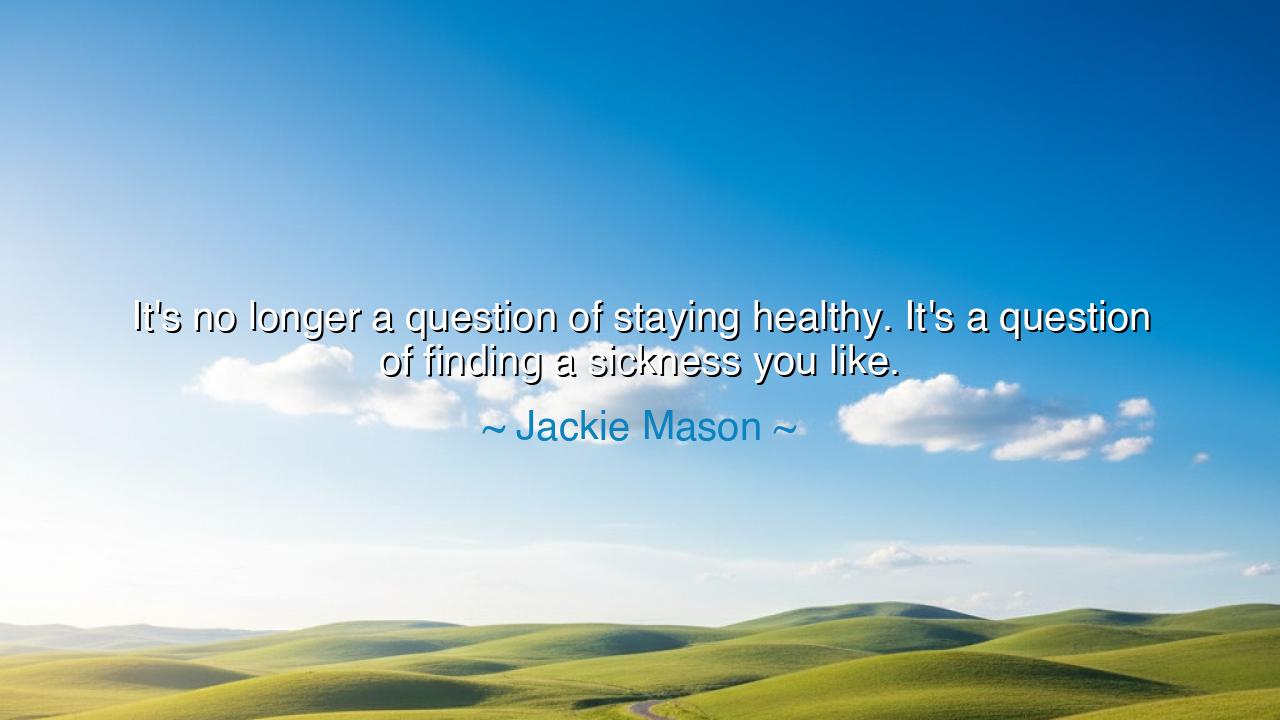
It's no longer a question of staying healthy. It's a question of
It's no longer a question of staying healthy. It's a question of finding a sickness you like.






“It’s no longer a question of staying healthy. It’s a question of finding a sickness you like.” Thus spoke Jackie Mason, the comedian-philosopher who clothed deep truth in the robes of humor. Behind the laughter of his words lies a mirror held up to modern humanity — a reflection both tragic and absurd. In this saying, he does not mock the ill, but the world that has grown so estranged from health, so accustomed to imbalance, that it accepts sickness as the new normal. His jest is a lament, a sigh from the soul disguised as a joke — for when irony speaks truth, wisdom laughs softly in the background.
In ancient times, health was not merely the absence of disease; it was harmony — the balance of body, mind, and spirit. The Greeks called it eukrasia, the perfect blending of humors. The Chinese sages called it chi, the flowing energy of life in accord with the heavens. To be healthy was to live rightly, to eat from the earth, to labor in moderation, to rest in rhythm with the sun and moon. But in our modern age, Mason’s words reveal a reversal: we have traded harmony for convenience, wisdom for speed, and the natural order for the machinery of comfort. Now, rather than seeking health, many resign themselves to choosing their sickness — the lesser poison among many.
There is a bitter truth in Mason’s humor. In a world of processed food and restless minds, of sleepless nights and endless striving, people no longer ask, “How may I be whole?” but, “Which ailment can I endure?” Some surrender to the sickness of anxiety, others to the sickness of greed, still others to the sickness of fatigue disguised as ambition. In this way, Jackie Mason speaks not only of the physical body, but of the soul itself — for modern sickness is as much spiritual as it is biological. His wit exposes the great irony of our time: that we have built temples to progress, yet forgotten to tend the temple of the self.
The ancients would have wept to see this age. Hippocrates, the father of medicine, warned that food should be our medicine, not our indulgence; Seneca, the Stoic sage, cautioned that excess is the enemy of peace. Yet how often do men chase pleasure until it becomes pain, or comfort until it becomes captivity? There is an old tale of a Roman general who, after conquering lands, grew ill from gluttony and idleness. “You have conquered nations,” said his physician, “but you cannot conquer your own appetite.” He was a man of victory, yet enslaved by his sickness — and in that irony, Mason’s humor finds ancient roots.
But Mason’s wisdom is not merely ridicule; it is a wake-up call. His words urge us to remember that health is not a luxury, but a responsibility. To “find a sickness you like” is to surrender — to accept the decline of vitality as destiny rather than consequence. The healthy life demands effort, discipline, and awareness. It requires saying no to the poisons the world offers — the constant noise, the empty pleasures, the convenience that corrodes. Mason’s humor, therefore, is a lamp shining in the fog: it mocks the madness of our habits so that we might awaken from them.
Consider the story of George Bernard Shaw, the playwright who lived into his nineties with clarity of mind and strength of body. When asked his secret, he said, “I eat sparingly, I sleep deeply, and I think cheerfully.” He understood, as Mason suggests through jest, that health begins not in medicine, but in moderation. In contrast to the modern man who must “choose his sickness,” Shaw chose discipline, and through that choice, found freedom. The body obeys the master it is given — if that master is wisdom, it thrives; if it is indulgence, it decays.
So, dear listener, let this teaching strike both your mind and your heart: do not laugh only at Mason’s humor — learn from it. See how far the world has drifted from simplicity. Reclaim your health as your birthright, not your burden. Eat what grows, rest when weary, breathe deeply of clean air, and guard your mind from the poisons of envy and haste. For to be healthy is to live in truth — and to live in truth is the highest form of freedom.
Practical actions for the seeker: Begin by asking yourself each morning: “What nourishes me today, and what weakens me?” Choose the nourishing thing. Move your body daily — it is the vessel of your purpose. Speak gratitude instead of complaint; feed your mind with stillness instead of noise. Laugh often, but let your laughter, like Mason’s, carry meaning. For if you live wisely, you need not “find a sickness you like” — you will have found the greater joy of health, which is the soul’s quiet harmony with life itself.






AAdministratorAdministrator
Welcome, honored guests. Please leave a comment, we will respond soon